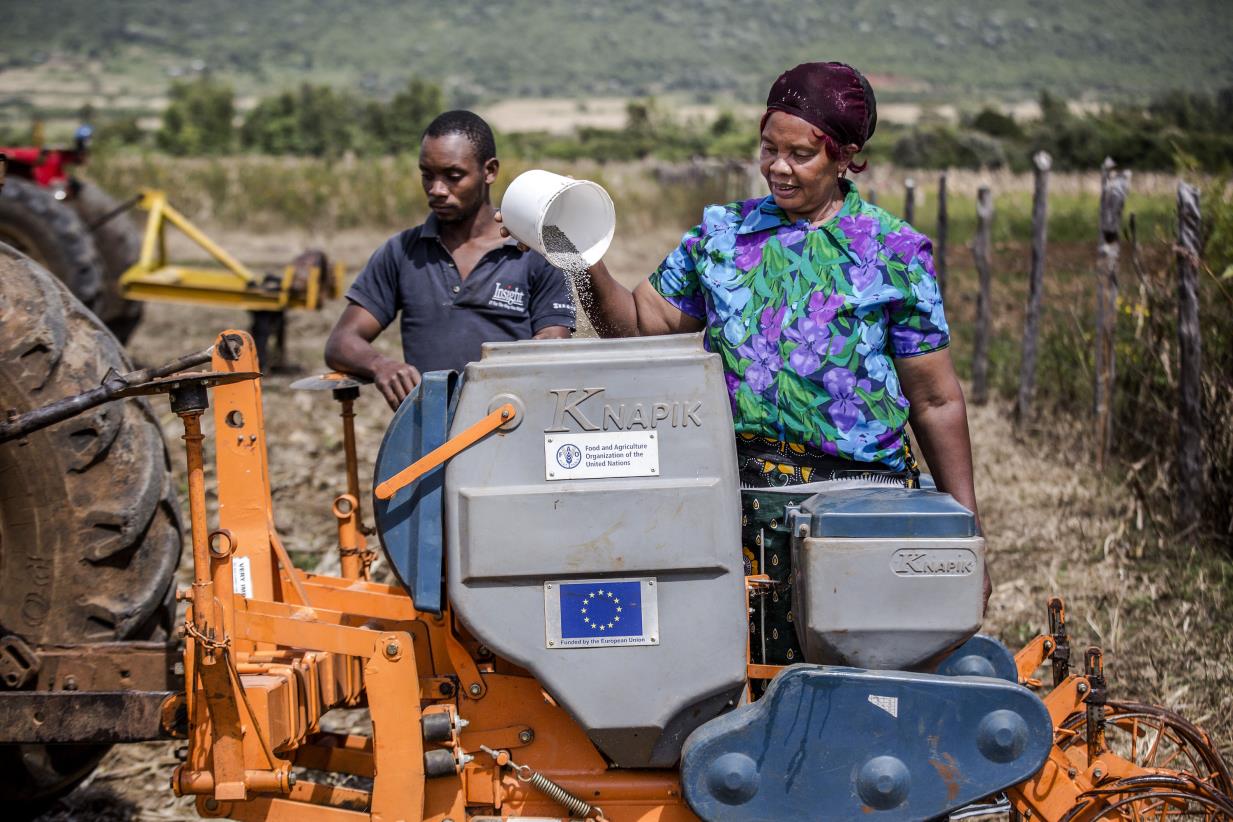Working together for the sustainable mechanization of farming in Africa
FAO and the African Conservation Tillage Network sign a collaboration agreement

Sustainable mechanization can alleviate drudgery, raise farm productivity, increase incomes and provide new jobs.
©Photo: ©FAO
07/02/2019
7 February 2019, Rome - The Food and Agriculture Organization of the United Nations (FAO) and the African Conservation Tillage (ACT) Network today signed a Memorandum of Understanding to encourage greater access for small-scale farmers to sustainable farm mechanization, such as two-wheeled tractors and other labour-saving machines.
The partnership also seeks to link the use of farming machinery to Conservation Agriculture which is a farming system that promotes minimum soil disturbance and the planting of complementary plant species to enhance biodiversity and natural biological processes.
In Africa, smallholder farmers use their own muscle power, such as hand hoes, for around 65 percent of the total labour needed for land preparation, with draught animal power accounting for 25 percent and engine-powered machines just 10 percent. In South Asia by comparison, human muscle power is used for 30 percent of land preparation work, while engine power represents 40 percent, and in Latin America and the Caribbean engine power is used for half of all land preparation.
"This agreement is an important part of ACT and FAO's work towards the adoption of sustainable agricultural mechanization across Africa which has the potential to transform the lives and livelihoods of millions of smallholder farmers. Massive adoption of Sustainable Agriculture, anchored in commercial, environmental and socio-economic sustainability, will significantly contribute to the attainment of the African Union's Vision 25x25 of the Malabo Declaration and Agenda 2063 - The Africa We Want," said Saidi Mkomwa, Executive Secretary of the African Conservation Tillage Network (ACT) at today's signing.
"One of the ways in which we can achieve sustainable agricultural production in Africa is through the adoption of Conservation Agriculture and more appropriate mechanization," said FAO Assistant Director-General Bukar Tijani who heads FAO's Agriculture and Consumer Protection Department. "This partnership for Africa will be a platform to bring together stakeholders from the private sector, farmers' groups, civil society, agriculture ministries and beyond to collaborate to achieve our vision of a Zero Hunger world," he added.
Linking mechanization to sustainable agriculture
Mechanization across the food value chain -- from production and harvesting to handling, processing and transportation -- alleviates drudgery, raises farm productivity, increases incomes and provides new jobs such as mechanization services and repairs. Sustainable mechanization can also conserve natural resources and enable agriculture systems to be more resilient to climate change.
The African Union has committed to banishing the hand hoe by 2025. Last year, FAO and the AU produced The Sustainable Agricultural Mechanization: A Framework for Africa (SAMA) and today's agreement with the ACT Network will contribute to implementing that framework.
The collaboration also aims to promote knowledge sharing and support greater policy dialogue on sustainable agricultural mechanization and Conservation Agriculture.
The ACT Network was established in 2006 and is a pan-African not-for-profit international organization dedicated to improving livelihoods in Africa through sustainable agriculture, agroecology, and ecosystem management.
The partnership also seeks to link the use of farming machinery to Conservation Agriculture which is a farming system that promotes minimum soil disturbance and the planting of complementary plant species to enhance biodiversity and natural biological processes.
In Africa, smallholder farmers use their own muscle power, such as hand hoes, for around 65 percent of the total labour needed for land preparation, with draught animal power accounting for 25 percent and engine-powered machines just 10 percent. In South Asia by comparison, human muscle power is used for 30 percent of land preparation work, while engine power represents 40 percent, and in Latin America and the Caribbean engine power is used for half of all land preparation.
"This agreement is an important part of ACT and FAO's work towards the adoption of sustainable agricultural mechanization across Africa which has the potential to transform the lives and livelihoods of millions of smallholder farmers. Massive adoption of Sustainable Agriculture, anchored in commercial, environmental and socio-economic sustainability, will significantly contribute to the attainment of the African Union's Vision 25x25 of the Malabo Declaration and Agenda 2063 - The Africa We Want," said Saidi Mkomwa, Executive Secretary of the African Conservation Tillage Network (ACT) at today's signing.
"One of the ways in which we can achieve sustainable agricultural production in Africa is through the adoption of Conservation Agriculture and more appropriate mechanization," said FAO Assistant Director-General Bukar Tijani who heads FAO's Agriculture and Consumer Protection Department. "This partnership for Africa will be a platform to bring together stakeholders from the private sector, farmers' groups, civil society, agriculture ministries and beyond to collaborate to achieve our vision of a Zero Hunger world," he added.
Linking mechanization to sustainable agriculture
Mechanization across the food value chain -- from production and harvesting to handling, processing and transportation -- alleviates drudgery, raises farm productivity, increases incomes and provides new jobs such as mechanization services and repairs. Sustainable mechanization can also conserve natural resources and enable agriculture systems to be more resilient to climate change.
The African Union has committed to banishing the hand hoe by 2025. Last year, FAO and the AU produced The Sustainable Agricultural Mechanization: A Framework for Africa (SAMA) and today's agreement with the ACT Network will contribute to implementing that framework.
The collaboration also aims to promote knowledge sharing and support greater policy dialogue on sustainable agricultural mechanization and Conservation Agriculture.
The ACT Network was established in 2006 and is a pan-African not-for-profit international organization dedicated to improving livelihoods in Africa through sustainable agriculture, agroecology, and ecosystem management.
Contact
Zoie Jones Regional Communications Officer (Regional Office for Africa) [email protected]
